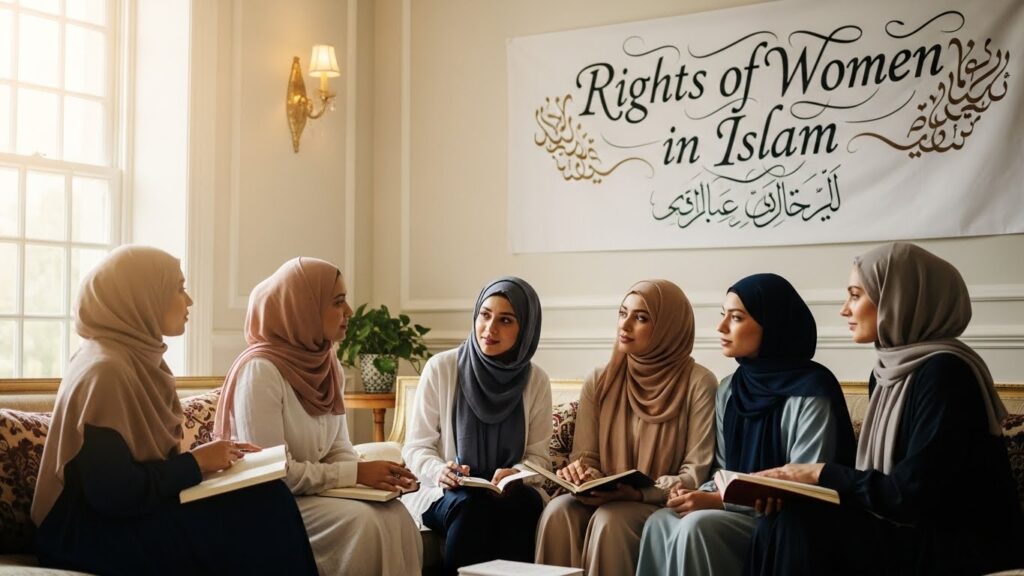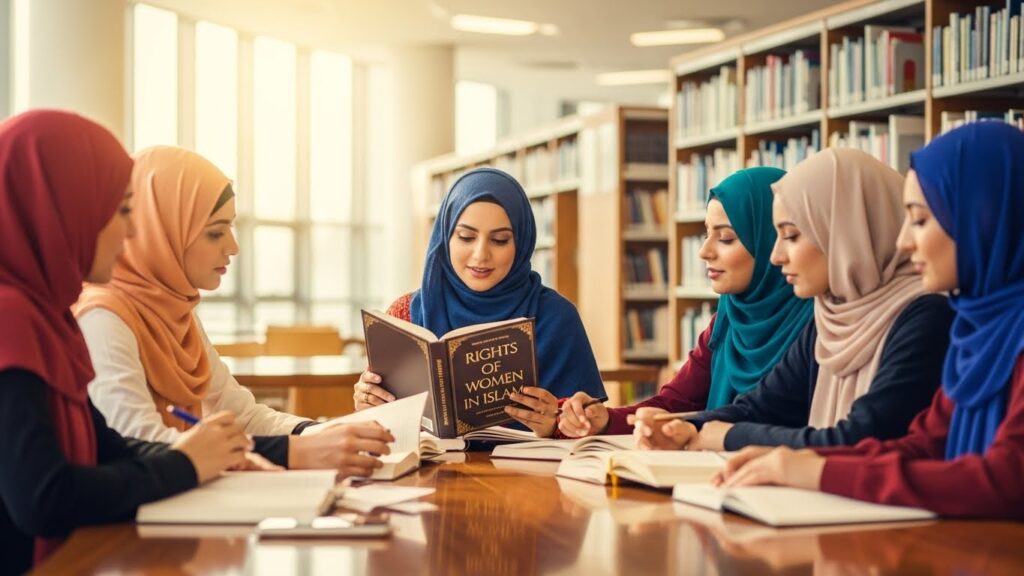Discover the true rights of women in Islam. Learn from Quran and Hadith about women’s spiritual, social, educational, and economic rights in Islam.
Introduction
The rights of women in Islam are an important topic. Many people misunderstand the role of women in Islam. Some judge Islam by culture instead of faith. For this reason it is necessary to look at the Islamic perspective on women.
Before Islam women had very few rights. Islam gave women respect, honor and protection. It granted them spiritual, social and economic rights. However, many people still believe that Islam limits women. In truth it provides balance and justice for them.
By studying the Quran and Hadith we learn the real rights of women in Islam. This knowledge clears doubts and shows the dignity Islam gives to women in every part of life.

Understanding the Status and Rights of Women in Islam
Before Islam women had little respect in society. Many cultures treated them as property. They could not inherit, own wealth or decide for themselves.
Islam changed this situation completely. The Quran and Hadith gave women honor and value. It showed that women are equal to men in faith and responsibility. The Islamic perspective on women highlights justice, dignity and balance in all areas of life.
Status of Women in Islam Compared to Pre-Islamic Times
In pre Islamic Arabia, daughters were often buried alive. Islam ended this cruel act. Women gained the right to live with respect and security.
The Dignity and Value of Women in Islam
The Quran describes women as partners in faith. It teaches that men and women both earn reward from Allah through good deeds. This shows the spiritual equality of women in Islam.
Rights of Women in Islam According to the Quran and Hadith
The Quran and Hadith give women clear rights and responsibilities. These teachings protect their dignity and secure their place in family and society.
Equal Spiritual Role of Women in Faith
The Quran states that men and women are equal in worship and reward. Therefore, both are responsible for their deeds. In addition, women share the same duty to obey Allah and follow His guidance.
Access to Knowledge and Education for Women
Prophet Muhammad ﷺ encouraged learning for both men and women. As a result, seeking knowledge became a right for every Muslim woman. Education empowers women to fulfill their roles in faith, family and society.
Social Position and Family Role of Women
Women in Islam have the right to kindness, respect and fair treatment. They may choose a spouse, maintain family ties and participate in community life. Furthermore, their role as mothers and daughters is highly valued.
Financial and Property Rights of Women
Islam gave women the right to own property, run a business, and inherit wealth. This was a revolutionary step in history. Moreover, a woman’s money remains her own and she is not obliged to spend it on the household.
Women’s Participation in Public Life and Decision-Making
From the time of the Prophet ﷺ, women took part in society. They gave advice, offered opinions and supported the community. On the other hand their roles were always balanced with family responsibilities. Finally, this shows that Islam allows women to contribute beyond their homes while protecting their rights.
Common Misconceptions About Women in Islam
Many people misunderstand women’s role in Islam. These views often come from culture not from the Quran or Hadith. Therefore, it is important to clear these doubts. Moreover, correcting false ideas helps people see the truerights of women in Islam.
The Meaning of Hijab and Modesty in Islam
Some believe the hijab is a sign of oppression. In reality, the hijab is a symbol of modesty and faith. It allows women to be valued for their character and knowledge. Furthermore, many Muslim women choose it with pride.
The Practice of Polygamy in Islam and Its Limits
Polygamy is often misunderstood. Islam allows it under strict conditions of fairness and justice. On the other hand, the Quran advises that if fairness is not possible then one wife is best. This shows that Islam protects women from harm.
Divorce and Women’s Rights in Marriage
Some assume that only men can end a marriage. However, Islam gives women the right to seek divorce under certain conditions. In addition, the process includes fairness, respect and clear rules for both husband and wife.
Women’s Freedom and Role in Society
Another misconception is that women cannot take part in society. In truth, Muslim women have always worked, studied and advised leaders. Moreover, their voices matter in family and community life.
Scholars’ Views on Women’s Rights in Islam
Muslims often look to scholars for guidance on sensitive topics. Therefore, their opinions play an important role in understanding the rights of women in Islam.
Classical Scholars on the Role of Women in Islam
Early Islamic scholars agreed that women deserve dignity and fairness. They explained that Islam gave women rights to property, marriage and education. In addition, they highlighted that women are spiritually equal to men before Allah.
Modern Scholars and the Status of Women in Islam
Contemporary scholars continue this discussion. Many stress that Islam gave women rights long before other cultures. Moreover, they remind us that cultural practices should not replace Islamic teachings. On the other hand, they also point out that new challenges, like women’s work and education, must be understood within Islamic principles.
Balance Between Tradition and Modern Life
Some scholars emphasize tradition while others highlight modern needs. Therefore, Muslims are encouraged to follow Islam’s core teachings while adapting to current times. In addition, both men and women are urged to act with justice, respect and responsibility.
Comparing Women’s Rights in Islam and Other Cultures
To understand women’s rights in Islam it helps to look at other societies. Islam raised women’s status at a time when many cultures denied them basic respect. Moreover, history shows that Islam gave women protections long before others did.
Women’s Position Before Islam in Arabia
In pre-Islamic Arabia, people often treated women unfairly. Many families buried their daughters alive. Women had no right to inherit property or make personal choices. Islam ended these practices and gave women honor, security, and rights.
Women’s Rights in Islam Compared to Western History
In Western societies women gained rights much later. For centuries, they could not vote, study, or own land. On the other hand Islam allowed women to own wealth, seek education and take part in society over 1,400 years ago. This proves that Islam was ahead in granting justice to women.
Social and Family Rights Across Cultures
Some cultures limit women’s freedom within the family. However, Islam encourages respect for women as mothers, daughters and wives. In addition, Islam teaches kindness and fairness in all relationships. This clear difference shows the value Islam places on women.
Modern Views on Women’s Freedom
Today, Western societies highlight freedom of choice. Islam also values freedom but sets moral guidelines. Therefore, Islam balances rights with responsibility. Moreover, it protects women from harm while giving them honor in every stage of life.

Quranic Verses on the Rights and Status of Women in Islam
The Quran speaks clearly about the respect and justice given to women. These verses show that women share equal spiritual value with men. Moreover, they highlight women’s rights in family, society, and faith.
Equality in Worship and Reward
Allah says in the Quran:
إِنَّ الْمُسْلِمِينَ وَالْمُسْلِمَاتِ وَالْمُؤْمِنِينَ وَالْمُؤْمِنَاتِ … أَعَدَّ اللَّهُ لَهُم مَّغْفِرَةً وَأَجْرًا عَظِيمًا
(Surah Al-Ahzab 33:35)
Translation: Indeed, the Muslim men and Muslim women, the believing men and believing women … Allah has prepared for them forgiveness and a great reward.
This verse shows that men and women are equal in faith and reward.
Right to Own Property and Wealth
Allah also says:
لِلرِّجَالِ نَصِيبٌ مِّمَّا اكْتَسَبُوا وَلِلنِّسَاءِ نَصِيبٌ مِّمَّا اكْتَسَبْنَ
(Surah An-Nisa 4:32)
Translation: For men is a share of what they earn, and for women is a share of what they earn.
This ayah proves that women have full rights to their income and property.
Honor and Respect for Mothers
The Quran commands:
وَوَصَّيْنَا الْإِنسَانَ بِوَالِدَيْهِ حُسْنًا
(Surah Al-Ankabut 29:8)
Translation: And We have enjoined upon man to be good to his parents.
Islam places great honor on mothers, giving them a special status in the family.
Hadith on the Rights and Honor of Women in Islam
The sayings of Prophet Muhammad ﷺ give clear guidance on women’s dignity. These Hadith explain how women should be treated with respect and fairness.
Kindness and Respect Toward Wives
The Prophet ﷺ said:
“The best of you is the one who is best to his wife, and I am the best among you to my wives.”
(Sunan Ibn Majah, Hadith 1977)
This Hadith shows that good character begins with kindness to one’s wife.
Value of Mothers in Islam
A man asked the Prophet ﷺ: “Who among people is most deserving of my good company?” He replied:
“Your mother.” The man asked again: “Then who?” He said: “Your mother.” The man asked a third time: “Then who?” He said: “Your mother.” Then the man asked: “Then who?” He replied: “Your father.”
(Sahih al-Bukhari, Hadith 5971; Sahih Muslim, Hadith 2548)
This Hadith highlights the high status of mothers in Islam.
Seeking Knowledge as a Right for Women
The Prophet ﷺ said:
“Seeking knowledge is an obligation upon every Muslim.”
(Sunan Ibn Majah, Hadith 224)
This includes both men and women, proving that education is a right for all.
Protection of Women from Harm
The Prophet ﷺ warned:
“Fear Allah regarding women. You have taken them as a trust from Allah.”
(Sahih Muslim, Hadith 1218)
This Hadith stresses the duty to protect women’s rights and treat them with fairness.
Conclusion
The rights of women in Islam are clear and balanced. The Quran and Hadith show that women are equal in faith, honor and reward. Islam gives women dignity as mothers, daughters, wives and members of society.
Moreover, Islam protects their social, financial, and educational rights. It allows women to own property, seek knowledge and live with respect. In addition, Islam commands kindness toward women and warns against injustice.
By understanding these teachings, we see that Islam does not oppress women. Instead, it raises their status and protects their dignity. Therefore, learning the true Islamic perspective on women clears many misconceptions.
Finally, Islam gives women honor ,justice, and rights that remain timeless. These teachings guide both men and women toward fairness, respect and balance in life.
